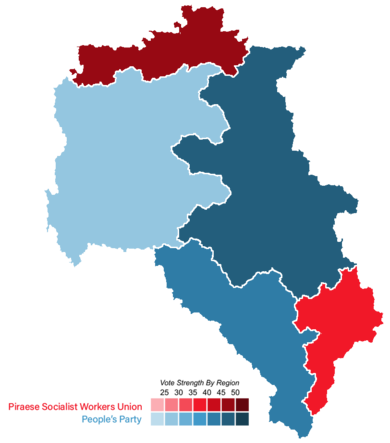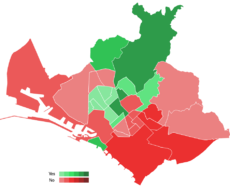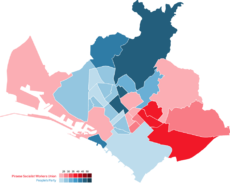1980 Piraean general election: Difference between revisions
| Line 215: | Line 215: | ||
}} | }} | ||
==Government formation and investiture== | ==Aftermath== | ||
After the general elections, Piraea formed the first democratically elected government since the First Republic. This ignited a number of political issues that were going to be tackled by the political system as a whole; most importantly, the government of Apostolou faced the end of censorship in [[Piraean Radio and Television|PRT]], the legalisation of the [[Piraese Section of the Workers' International]] and the [[General Confederation of Piraese Workers]], the democratisation of the military and the creation of a new constitutional framework, which resulted in the [[Piraea|Third Republic]]. A new economic panorama and the issue regarding the Euclean integration were also heavily discussed topics during the first years of the Apostolou governments. In 1982, after having legalised the PTED, Ioannis Apostolou called a {{wp|snap election}} together with the [[PSEE]], in order to "reconstruct the political system". | |||
===Government formation and investiture=== | |||
The first government of Ioannis Apostolou was formed the 15 February 1980, with the absolute majority of the [[People's Party (Piraea)|People's Party]] and votes of the [[Centre Union (Piraea)|Centre Union]]. The two {{wp|far-right}} parties considered the abstention. | |||
{| class="wikitable" style="text-align:center; font-size:100%;" | {| class="wikitable" style="text-align:center; font-size:100%;" | ||
|- | |- | ||
| Line 221: | Line 224: | ||
! style="width:100px;"| Date | ! style="width:100px;"| Date | ||
! style="width:50px;"| Vote | ! style="width:50px;"| Vote | ||
! style="width:43px;"| | ! style="width:43px;"| [[File:Emblem of the Christian Democrat Party of Chile.svg|25px|People's Party (Piraea)|LK]] | ||
! style="width:35px;"| [[File: | ! style="width:35px;"| [[File:Puño y rosa.png|25px|Piraese Socialist Workers Union|PSEE]] | ||
! style="width:35px;"| [[File:ΕΚ Logo.png|60px|Centre Union (Piraea)|EK]] | ! style="width:35px;"| [[File:ΕΚ Logo.png|60px|Centre Union (Piraea)|EK]] | ||
! style="width:35px;"| [[File:Democratic Socialism Piraea.png|45px|Democratic Socialism (Piraea)|DS]] | ! style="width:35px;"| [[File:Democratic Socialism Piraea.png|45px|Democratic Socialism (Piraea)|DS]] | ||
| Line 234: | Line 237: | ||
[[Ioannis Apostolou]] | [[Ioannis Apostolou]] | ||
<br>[[File: | <br>[[File:Emblem of the Christian Democrat Party of Chile.svg|45x45px]] | ||
|rowspan=3|'''15 February 1980'''<br/><small>{{nowrap|Absolute majority}} required (61/125)</small> | |rowspan=3|'''15 February 1980'''<br/><small>{{nowrap|Absolute majority}} required (61/125)</small> | ||
|align="left"|Yes {{tick|15}} | |align="left"|Yes {{tick|15}} | ||
| Line 270: | Line 273: | ||
|- | |- | ||
|} | |} | ||
==Notes== | ==Notes== | ||
{{notelist}} | {{notelist}} | ||
[[Category:Piraea]] | [[Category:Piraea]] | ||
Revision as of 22:50, 4 February 2023
| |||||||||||||||||||||||||||||||||||||
All 125 seats to the Piraean Courts 61 seats needed for a majority | |||||||||||||||||||||||||||||||||||||
|---|---|---|---|---|---|---|---|---|---|---|---|---|---|---|---|---|---|---|---|---|---|---|---|---|---|---|---|---|---|---|---|---|---|---|---|---|---|
| Turnout | 79.8% | ||||||||||||||||||||||||||||||||||||
This lists parties that won seats. See the complete results below. | |||||||||||||||||||||||||||||||||||||
 Most voted-for party by region in Piraea proper | |||||||||||||||||||||||||||||||||||||
| |||||||||||||||||||||||||||||||||||||
The 1980 Piraean general election was the first democratic election of Piraea after the military dictatorship to elect the members of the Piraean Courts (now Senate) and the new premier of the republic. It was extraordinarily held on 1 February 1980 and marked the start of the Piraean metapolitefsi.
The elections were agreed in 1979, after the military junta lost the national plebiscite in which it sought to legitimise a new leader. In September of 1979, the two largest parties of Piraea, the PSEE and the People's Party, signed, together with other minor legal parties, the conditions for the transition under the Hankssun 300 Pact; the military junta agreed the disassociation from the new government and institutions on the conditions of inmunity and the outlaw of the Piraese Section of the Workers' International. Most of the members of the illegal PTED participated under the Progressive Federation platform together with other clandestine leftist minor groups.
After the general elections the 1st Legislature of the Piraean Senate were formed, with an absolute majority from the People's Party, which counted with the PSEE as the main opposition party. The new premier, Ioannis Apostolou was invested with the votes of LK and Centre Union, while the post-Functionalist far-right proposed their abstention.
Background
1979 national plebiscite
The year prior to the general elections, the military junta proposed and celebrated a national plebiscite aimed to legitimise a new term of the recently elected junta leader, Ioannis Christodoulopoulos, who was appointed by the dictator of the Second Piraean Republic, Konstantinos Athanopoulos, in the minutes prior to his death. The plebiscite counted with an important campaign of the two options, "Yes" (Ναι; endorsed by the political right and the junta) and "No" (Όχι; endorsed by the left and society groups in clandestine), which gradually normalised political activity in the country.
However, the rejection of the junta's proposal, forced the military to initiate contacts with the political world to host elections and transition towards democracy. Christodoulopoulos held several contacts with the Ioannis Apostolou (People's Party) and Andrianos Rodiales (PSEE).
1979 Hankssun 300 Pact
The 4 September 1979, the military junta and the leaders of the main political parties signed the Hankssun 300 Pact, an agreement that specified the conditions of the metapolitefsi. The agreement became controversial in the cores of both the democratic right and most of the left, as it granted immunity to junta leaders and censored the Piraese Section of Workers' International from participating in the election. However, Apostolou and Rodiales argued that the pact was crucial for the dissociation of the army from the politics.
Campaign
Censorship and observers
Televised debates
Participating parties
| Candidacy | Leading candidate | Ideology | ||
|---|---|---|---|---|
| Ioannis Apostolou | Liberal conservatism Economic liberalism Christian democracy | |||
| Andrianos Rodiales | Progressivism Social democracy Secularism Pro-Eucleanism | |||
| Stefanos Sarropoulos-Larraz | Neoliberalism Liberal conservatism Right-wing populism | |||
| Nikos Procopiiadis [a] | Social democracy Democratic socialism Pro-Euclean Community | |||
| Theodoros Kouras [b] | Councilism Democratic socialism | |||
| Theofanis Kanatos | Progressivism Green politics Humanism Social liberalism | |||
| Dorotheos Apostolakis | Social conservatism Militarism | |||
| Charalambos Artinidis | Social conservatism Militarism Nationalism Piraean irredentism | |||
Results
The results showed important changes from the previous national plebiscite; several analysts predicted the first government of the centre-left due to the contundent rejection of the population to the continuity of the military junta. However, during the campaign, the military leadership was seen as divided, supporting the far-right candidates of New Force-National Alliance and National Party, leaving Ioannis Apostolou, from the moderate centre-right wing, without the mark of the military dictatorship. The PSEE, which was considered a preferred option, saw internal divisions after signing the Hankssun 300 Pact, with Democratic Socialism dividing the voting share.
The results, however, marked a significant trend that has been present in the politics of Piraea since then; with the region of Foinikas being predominantly conservative, together with the north-western neighborhoods of Alikianos and its "central almond". This, in contrast to the regions of Lampi and Samariá, where the centre-left and left has been a lot more stronger.
| 40 | 3 | 3 | 1 | 8 | 1 | 1 | 68 |
| Piraese Socialist Workers Union | PO | DS | AK-P | EK | EKN | VD-ES | People's Party |
Aftermath
After the general elections, Piraea formed the first democratically elected government since the First Republic. This ignited a number of political issues that were going to be tackled by the political system as a whole; most importantly, the government of Apostolou faced the end of censorship in PRT, the legalisation of the Piraese Section of the Workers' International and the General Confederation of Piraese Workers, the democratisation of the military and the creation of a new constitutional framework, which resulted in the Third Republic. A new economic panorama and the issue regarding the Euclean integration were also heavily discussed topics during the first years of the Apostolou governments. In 1982, after having legalised the PTED, Ioannis Apostolou called a snap election together with the PSEE, in order to "reconstruct the political system".
Government formation and investiture
The first government of Ioannis Apostolou was formed the 15 February 1980, with the absolute majority of the People's Party and votes of the Centre Union. The two far-right parties considered the abstention.
| Candidate | Date | Vote | Total | ||||||||
|---|---|---|---|---|---|---|---|---|---|---|---|

|
15 February 1980 Absolute majority required (61/125) |
Yes |
68 | 8 | 76 / 125
| ||||||
| No | 40 | 3 | 3 | 1 | 47 / 125
| ||||||
| Abs. | 1 | 1 | 2 / 125
|
Notes
- ↑ Democratic Socialism was a split from the PSEE after Rodiales signed the Hankssun 300 agreement with Apostolou and the military junta; the party merged again with the PSEE in 1993.
- ↑ Progressive Federation was the political brand that used several members of the PTED during the elections, since the party was considered illegal by the Ministry of Interior and Information; Progressive Federation was refunded as PTED in 1982.









